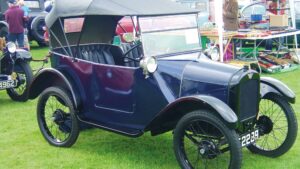Austin 7: Road car buying guide
Robert Ladbrook looks at the tiny car that changed road travel forever and launched more than a thousand racing variants

An Austin 7 ‘five- seater’ in 1923 with ample space for pets. Seatbelts were still decades away
Back in the early 1900s, your automotive options were rather limited, to say the least. On the one hand if you were rich, you were fine: with hefty Ford Model Ts, Panhards, Mercedes and such about. If you weren’t suitably flush, well… you could have a flimsy cycle car, a motorbike – or walk.
That was the case until the Austin 7 arrived in the 1920s, the diminutive 700cc wonder that brought private motoring to the people on a scale never seen before, or arguably since.
It’s safe to say the Austin 7 will go down as one of the most significant automotive creations in history, with almost 300,000 built worldwide. The 7 sparked new brands, including some minnow called BMW, and broke numerous racing records. Around 10,000 still exist today, a full century after the first ones rolled off the production line.
Not bad for a model that so nearly didn’t get off the ground at all. Austin was among Britain’s earliest car makers, with founder Herbert Austin building his first three-wheeled automobile back in 1895 before starting work for Wolseley and eventually founding Austin Motor Company in Longbridge in 1905. Its early cars were sizeable offerings like limousines, grand tourers and coupés, but the firm struggled to gain market share and needed to think outside the rather elongated automotive boxes it had been creating.
Spurred on by the introduction of the RAC ‘Horsepower Tax’ of 1921 and Austin’s need to drag itself out of receivership in the wake of the First World War, Austin began work on creating a small car for the masses, with simple mechanicals and a small engine to escape the costly taxation. The issue was that the Austin board and creditors weren’t keen on gambling on its development, so Herbert took matters into his own hands.
With much of the design work being conducted in the billiard room of his own home, aided by a young draughtsman named Stanley Edge, the basic 7 design and plan for the 20bhp four-cylinder engine was conceived and three prototypes built. The first production 7s were unveiled in 1922. Just 2500 were made in the first year but, as word spread of their affordability (around £110 for the entry-level model, equivalent to £6500 now), demand soon soared, with production ongoing until 1939.
The engine was uprated to the familiar 750cc unit in 1923 and the model also sparked a racing revolution. Its lightweight chassis made it a hit, with numerous racing specials created by the likes of Arthur Waite (Herbert Austin’s son-in-law) and Gordon England, who would create streamlined variants that decimated class records at Brooklands. A 7 also proved pivotal for a young Bruce McLaren in New Zealand.
The 7 proved an incredible all-rounder, with over 50 body styles developed – from saloons, to sports versions, vans and military vehicles.
 One for sale
One for sale
1923 Austin 7 ‘Chummy’
Chassis 1701. Full restoration, all correct parts and original handle-starter.
£25,000
carandclassic.co.uk
Austin 7 statistics
Price new £110 (van/tourer) to £210 (AD Saloon)
Price now £3000-£45,000
Engine 696cc side-valve four-cylinder, uprated to 747cc from 1923
Rivals In its day there was nothing like it.
Verdict An icon, and now an ideal entry point to vintage car ownership.
